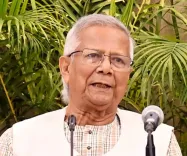Why Did Thailand's Supreme Court Order Former PM Thaksin Back to Jail?

Synopsis
Key Takeaways
- Thaksin Shinawatra must return to prison after unlawful hospital detention.
- The court ruled that hospital time does not count towards his sentence.
- Thaksin returned to Thailand after 15 years in exile.
- He faced an eight-year sentence, reduced to one year by royal pardon.
- He was acquitted of royal defamation charges due to lack of evidence.
Bangkok, Sep 9 (NationPress) The Supreme Court of Thailand determined on Tuesday that former Prime Minister Thaksin Shinawatra was wrongfully permitted to remain in hospital detention and must return to prison to fulfill his sentence.
The court's Criminal Division for Holders of Political Positions ruled that Thaksin's six-month stay in a medical facility cannot be considered as time served for his one-year prison sentence, as reported by Xinhua News Agency.
"The duration spent in a police hospital cannot be subtracted from the total days of imprisonment," the court's announcement stated.
"As a result, the defendant must serve the complete one-year prison sentence as mandated by a royal decree," it added.
Thaksin returned to Thailand in August 2023 after being in self-imposed exile for more than 15 years. Upon his arrival, he was detained to serve an eight-year sentence due to three convictions related to corruption and abuse of power, which was subsequently reduced to one year by royal pardon.
After spending less than 24 hours in jail, he was moved from a Bangkok prison to the Police General Hospital due to serious health issues.
The 76-year-old previously served as the Prime Minister of the Southeast Asian nation from 2001 to 2006.
Earlier in August, Thailand's criminal court cleared Thaksin of royal defamation charges stemming from comments made to foreign media a decade prior.
Thaksin was acquitted due to a lack of sufficient evidence demonstrating his wrongdoing, as stated by the court.
"The case has been dismissed," Thaksin told reporters as he exited the courthouse.
The evidence presented by the prosecution did not fulfill the necessary burden of proof for the indictment, according to Thaksin's lawyer Winyat Chatmontree.
Thaksin expressed gratitude to his legal team following the verdict, stating he could now focus on contributing to the nation's welfare, as Winyat informed reporters after the ruling.
The Office of the Attorney General had charged Thaksin last year, alleging he defamed the monarchy during an interview with a South Korean media outlet in 2015, thus breaching lese majeste and computer crime laws.
The lese-majeste law, or Section 112 of the Criminal Code, stipulates that anyone who defames, insults, or threatens the king, queen, heir apparent, or regent may face imprisonment ranging from three to 15 years.








